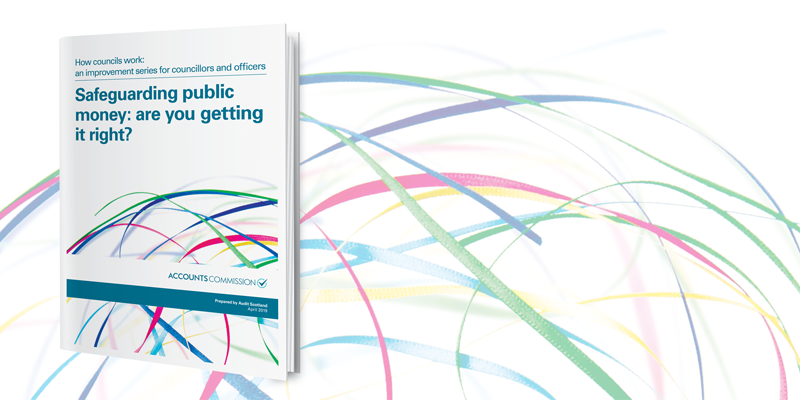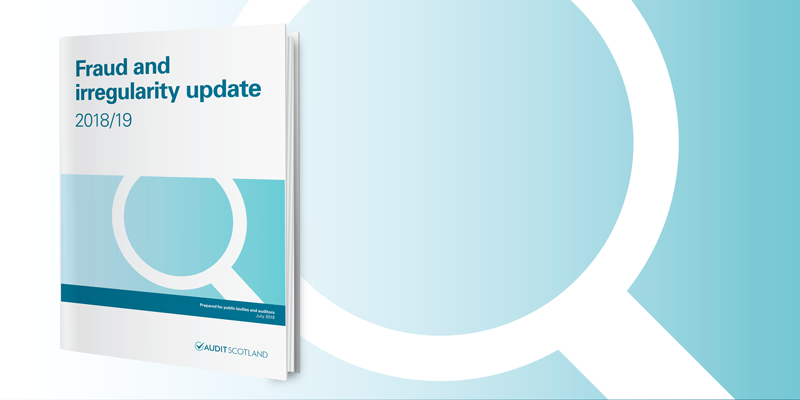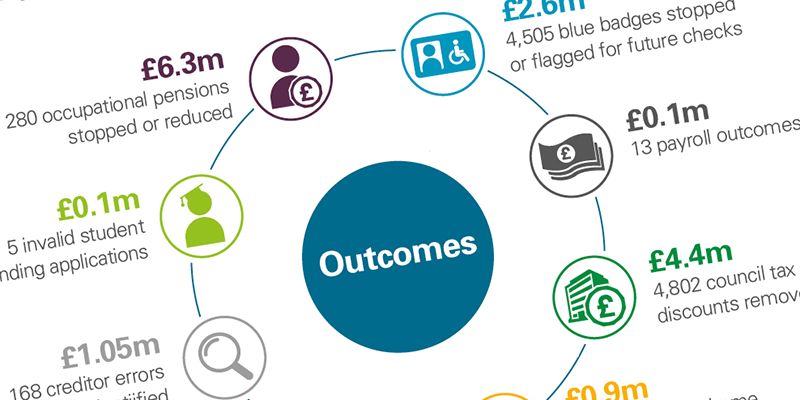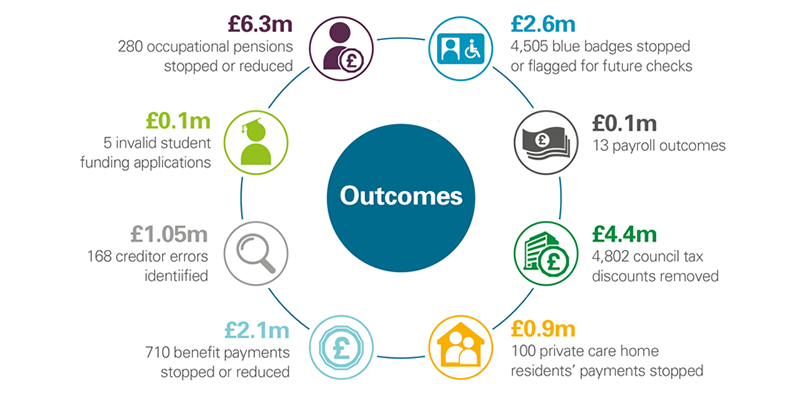Counter-fraud

Here you will find information about the range of counter-fraud work that Audit Scotland is involved in as well as signposts to other organisations with an interest in this area.
As public finances continue to tighten and the number of people working in the public sector reduces, there is a risk that controls set up in public bodies to combat fraudulent activity, corruption and error are compromised. This can result in the loss of public money and affect our public services. Read more about Audit Scotland's work and the partners we work with in Angela Canning's blog.
Raising a concern about fraud or corruption
If you believe that there is fraudulent activity going on in a Scottish public body, you can find out how to tell us and share your information with us here, or you may wish to report your concerns directly to the police.
Procurement in the public sector - how red flags can help us to stop and consider fraud
Audit Scotland and Police Scotland have developed a document which highlights some red flags in procurement activity and the controls that can help to prevent fraud.
Download the document on red flags in procurement - PDF 2.1Mb

National Fraud Initiative
The National Fraud Initiative (NFI) in Scotland is a counter-fraud exercise led by Audit Scotland, and overseen by the Cabinet Office for the UK as a whole. It uses computerised techniques to compare information about individuals held by different public bodies, and on different financial systems that might suggest the existence of fraud or error. It means that public bodies can take action if any fraud or error has taken place, and it allows auditors to assess fraud prevention arrangements which those bodies have.
The National Fraud Initiative in Scotland 2016/17
Published in July 2018, the latest report identified nearly £19 million of fraud and error across the public sector.
Case study: East Dunbartonshire Council
The Cabinet Office has published a case study illustrating how the council used the NFI's AppCheck to verify information submitted in applications across its departments.
Our animation explains some of the key facts from the report.
National Fraud Initiative outcomes 2016/17
The 2016/17 Scottish NFI outcomes are derived from the 2016/17 NFI exercise and late outcomes from the 2014/15 NFI exercise. Detailed data from the 2016/17 exercise can be downloaded below.
Information for the 2018/19 National Fraud Initiative exercise
Instructions for participants 2018/19
The 2018/19 instructions include important guidance and instructions for participating bodies including data requirements, data specifications and the 2018/19 timetable. It will be regularly updated throughout the exercise.
Participants in the National Fraud Initiative 2018/19
This details the Scottish bodies participating in the 2018/19 exercise in Scotland.
Privacy notice
This broader description forms part of the privacy notice for individuals whose information is submitted to Audit Scotland for the purpose of the National Fraud Initiative in Scotland.
Self-appraisal checklist
This document contains a two-part checklist that we encourage all participating bodies to use to self-appraise their involvement in the NFI. Part A is designed to assist audit committee members and Part B is for officers involved in the NFI exercise.
Some suggestions for improving the efficiency and effectiveness of reviewing and investigating NFI matches are also included.
National Fraud Initiative - Self-appraisal checklist - PDF 420Kb
Code of data matching practice 2018
This Code of data matching practice was issued on 28 September 2018 under Section 26F of the Public Finance and Accountability (Scotland) Act 2000 (as amended).
Data specifications
The dataset specifications for the National Fraud Initiative (NFI) 2018 to 2019 national exercise and NFI council tax single person discount 2018 to 2019 exercise have been set by the Cabinet Office and are as follows:
Changes for 2018 to 2019 exercise - PDF 49Kb
Electoral Register data specification - PDF 105Kb
Trade creditors standing data specification - PDF 64Kb
Trade creditors payment history data specification - PDF 55Kb
Council Tax data specification - PDF 131Kb
Personal budgets and social care payments data specification - PDF 119Kb
Transport passes and permits data specification - PDF 154Kb
Pensions data specification - PDF 90Kb
Private supported care home residents data specification - PDF 56Kb
Payroll data specification - PDF 80Kb
Council Tax Reduction Scheme data specification - PDF 144Kb
Licenses data specification - PDF 87Kb
NHS Patient Exemptions (Scotland only pilot) data specification - PDF 217Kb
Housing waiting list data specification - PDF 70Kb
Housing tenants data specification - PDF 99Kb
Non domestic rates (Scotland only pilot) data specification - PDF 87Kb
National Fraud Initiative contact details
The NFI in Scotland is overseen by Audit Scotland. Our phone number for all NFI enquiries is: 0131 625 1500.
Information about the UK NFI exercise can be found on the Cabinet Office’s website at www.gov.uk/government/collections/national-fraud-initiative.
Bodies participating in NFI in Scotland should note that they can update their contact details via the 2016/17 NFI secure website or by sending an email to nfiqueries@cabinetoffice.gov.uk.
Other work we do

Safeguarding public money: are you getting it right?
The Accounts Commission has produced this report as part of its 'How councils work' series for councillors. It includes checklists to help them make sure their councils’ money is being safeguarded.
Download the report on safeguarding public money - PDF 2.1Mb

Fraud and irregularity report 2018/19
This report provides a summary of the cases of fraud and other irregularities at public bodies reported by external auditors for the financial year 2018/19.

Presentations
We regularly give presentations about the National Fraud Initiative and our work. The presentation below was made to CIPFA.

Dundee City Council: Report on significant fraud
Our report on the 2016/17 audit of Dundee City Council found that a £1 million fraud perpetrated at Dundee City Council from 2009-2016 was the result of failures in fundamental controls within the council’s financial systems.

Auditors' responsibilities relating to fraud
This International Standard on Auditing, published by the Financial Reporting Council in July 2017, deals with auditors’ responsibilities relating to fraud in an audit of financial statements.

Code of audit practice
Our Code of audit practice sets the framework for public audit in Scotland, and outlines the responsibilities of external auditors appointed by the Auditor General for Scotland and the Accounts Commission. This includes auditors' responsibilities regarding fraud.

Working with NHS Scotland Counter Fraud Services
We work with NHS Scotland Counter Fraud Services (CFS) in the deterrence, prevention and detection of fraud and other irregularities in NHS Scotland and other public bodies where CFS provides counter fraud services. The memorandum of understanding below outlines how we work together.
NHS Scotland Counter Fraud Services - Memorandum of understanding - PDF 113Kb
Resources
Protecting public resources in Scotland
Produced by the Scottish Government in 2015, this sets out a strategic approach to fighting fraud and error across the public sector in Scotland.
Cabinet Office Behavioural Insights Team paper on fraud, error and debt
The Behavioural Insights Team uses behavioural science to make public services more cost-effective and easier to use.Their paper on fraud, error and debt sets out some of the most effective actions which public bodies can take to reduce fraud, error and debt.
Other bodies
Cross-Sector Counter Fraud Forum
The objectives of this forum are to share counter fraud intelligence and promote opportunities for joint working across all sectors in Scotland. It also looks at how counter fraud best practice can be disseminated to public sector organisations in Scotland.
The Counter Fraud Maturity Model provides guidance on how mature your counter fraud controls are.
NHS Scotland Counter Fraud Services
NHS Scotland Counter Fraud Services deals with the prevention, detection and investigation of fraud, embezzlement, theft, corruption and other irregularities against NHSScotland.
Police Scotland
The Police Scotland website includes information about different types of fraud, advice on how to avoid becoming a victim and contact details for reporting a fraud to the police.
 Audit Scotland
Audit Scotland
